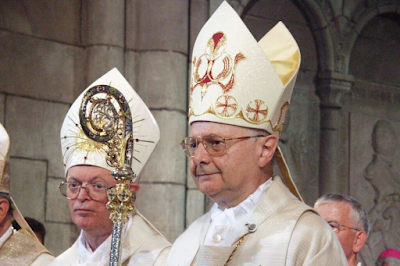Web of complicity at top of German Church
Cultivated disinterest of the church
It must not remain without consequences that Catholic bishops have broken the law in cases of abuse, writes guest author,Thomas Schüller.
The Archbishops of Freiburg, Robert Zollitsch and Oskar Saier, systematically ignored church law in dealing with acts of clerical abuse, disregarded state laws, protected perpetrators and gave victims the cold shoulder. This was revealed by the recently published investigation report of the archdiocese. In Zollitsch's case, there is also the fact that as chairman of the German Bishops' Conference in 2010, he deceived the government as well as the entire public in a dispute with the then Federal Minister of Justice Sabine Leutheusser-Schnarrenberger (FDP).
So what are the consequences? The politicians of the state of Baden-Württemberg with their over-identified Catholic Prime Minister Winfried Kretschmann (Greens), who likes to praise the churches' service to the common good in Sunday speeches and wants to continue paying state benefits because the churches do so much good for society, remain silent.
Obviously, one does not want to get on the wrong side of the churches. The victims of sexualised violence must continue to be victims. Symbolic actions such as Zollitsch's return of the Federal Cross of Merit and the Staufer Medal or the taking down of the oil paintings of both former Archbishops in the Freiburg Bishop's house are then the maximum of reactions to the yet again disillusioning report from Freiburg.
This raises urgent questions: Which henchmen at the headquarters of the German Bishops' Conference in Bonn supported Zollitsch in 2010? What did Father Hans Langendörfer SJ, long-time Secretary of the Bishops' Conference and closest collaborator of the respective chairman, know? Was he also involved in the systematic cover-up in his public relations work?
Why did the Bishops never address Zollitsch about the fact that no cases of abuse were reported to Rome from the Archdiocese of Freiburg, while this happened in the other dioceses - hesitantly at first, but nevertheless it did? One could also ask the Bishop of Rottenburg-Stuttgart, Gebhard Fürst, who was publicly appalled by Zollitsch.
Sure, he took measures early on to deal with sexualised violence, but on the other hand he has not yet presented a conclusive report on his large diocese. After all, a very elderly predecessor, Cardinal Walter Kasper, is still alive. It is easy, like Fürst, to point the finger at others while taking a lot of time yourself - time that those affected no longer have in their lives.
And the Church public? Ritualised moderation is one of the daily compulsory exercises of organised lay Catholicism in Germany. The cry of the victims rarely reaches them.
And the current Archbishop Stefan Burger? He will certainly do everything he can to ensure that such atrocities and their cover-up will never happen again. But the question of what this unspeakable scandal in his Archdiocese could have to do with the clerical distribution of power is one that he too evades.
Cathcon: The author would think synodality is the solution, rather it compounds the problem.










.jpeg)

Comments